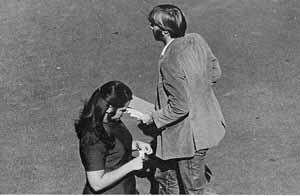By the incoming Class of 1977, the numbers of women admitted to Rutgers College had risen greatly. Today more than half of Rutgers students are women. Beginning with the Class of 1972, women at Rutgers (and across the country) proved to be student leaders, reporters for their school papers, yearbook editors, scholars, and athletes. Much to their credit, the debate over coeducation seems foreign to students today.
Would you have applied to Rutgers College in 1971? In your response discuss the issue of coeducation and the various arguments your heard. What other factors might influence your decision?
Image

Other questions and topics to explore
- Define the early goals of coeducation - were they met? Why or why not?
- Discuss the issues of equality that remain today. For example, is there complete equality at your school? (Think of athletics, faculty, etc.) In politics? In film?
- Research the stories of female wrestlers or female football players at either the high school or collegiate level. What types of discrimination do they face? If you are a female, would you want to support females going into traditionally male sports? If you are a male, what are your thoughts on letting girls wrestle and play football?
- While Rutgers was one of the last publicly funded colleges to go co-ed, many women were in co-ed institutions during this time period. Interview a woman who went to school during the late 1960s or early 1970s. Compare her story with those who attended Rutgers.
- Discuss the pros and cons of coeducation. What is your opinion — should there be separate female and male institutions? Elaborate on your response.